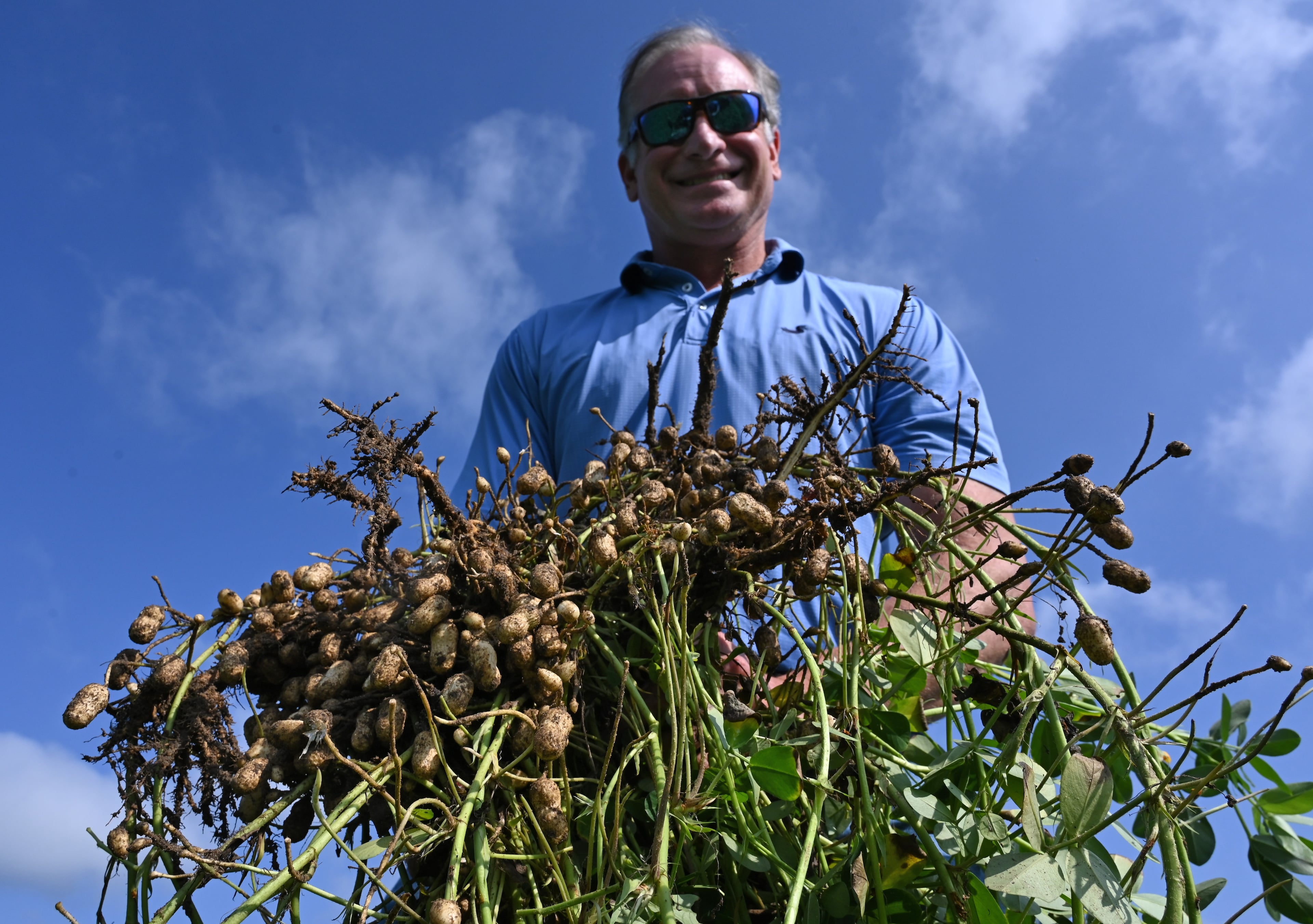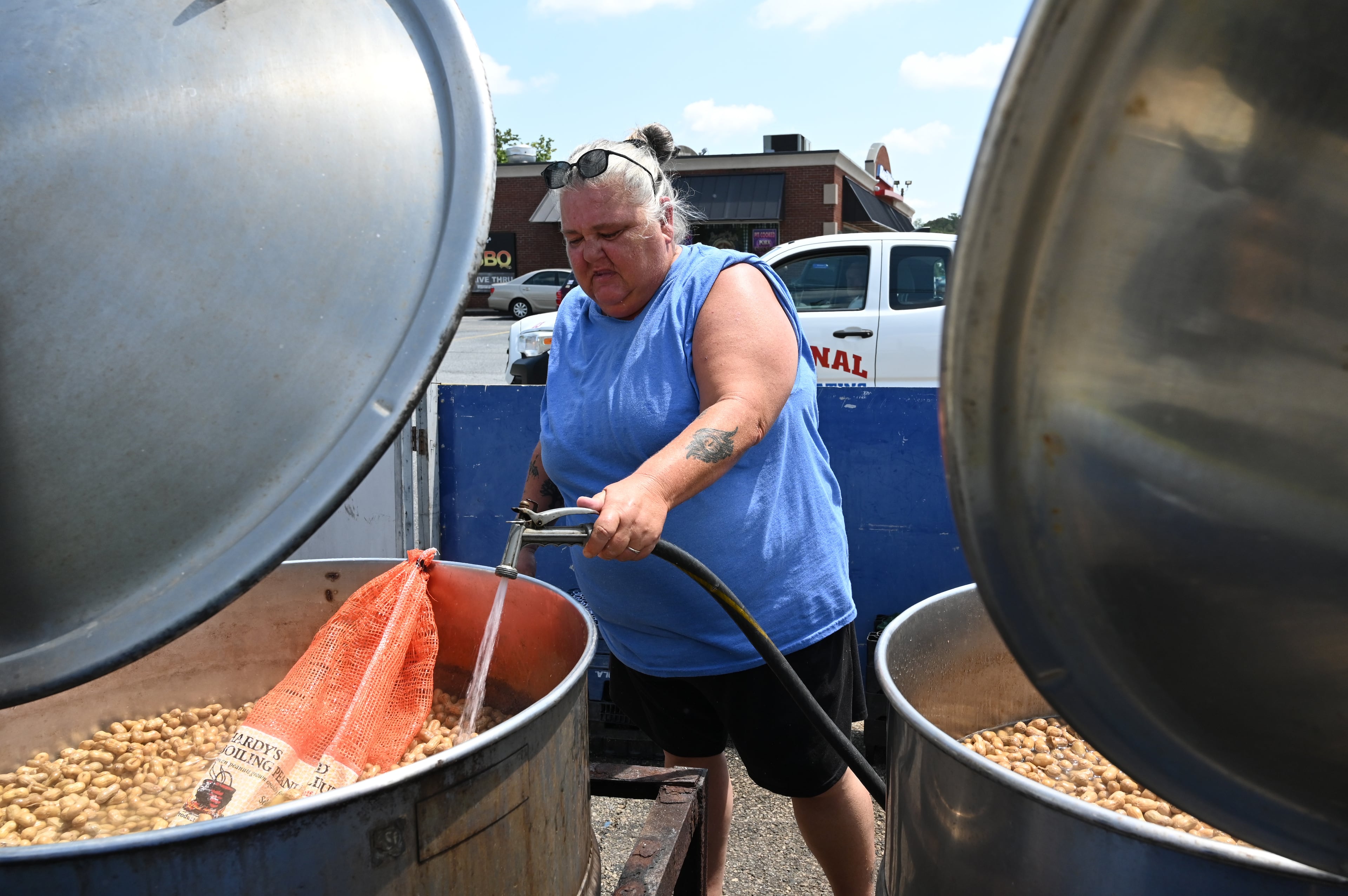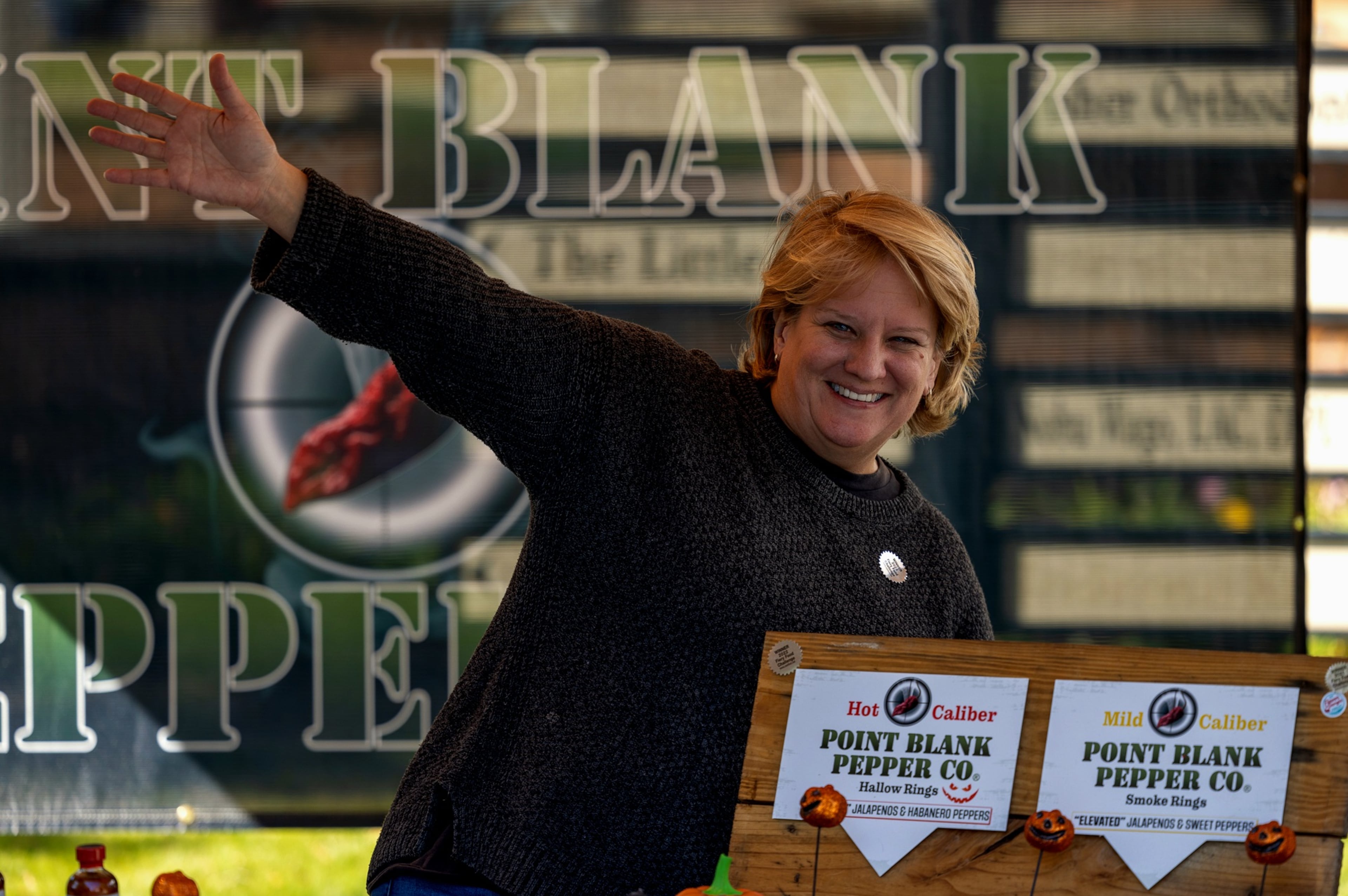At these boiled peanut stands, a Southern tradition steams into the future

WARNER ROBINS — Timmi Moore ducks into a sliver of shade to hide from the midmorning sun. But not too much. Passersby along this roasting strip of Middle Georgia roadway need to know she is open for business.
Fifteen feet from the open-air shed where she works, a propane burner hisses beneath a 40-gallon, stainless-steel vat of fresh green peanuts on their way to boiling.
“You smell that?” Moore asks a visitor.
The late-July air is already a stew of humidity. Now it steams anew with the scent of raw earth and salt. It’s the peanuts, in their burlap-colored shells, bathing in brine, bubbling up white foam and an invisible fog that tells Moore — and anyone within sniffing range — that they are now cooking.

For Moore, 52, a former Huddle House server, the daily brew is a seasonal ritual. Hundreds, or more likely thousands, of stands pop up across the Deep South, typically sprouting beside pickup trucks or at glorified lean-tos wherever traffic might flow.
What is different about Moore’s stand is that it is overseen by a family of peanut farmers, the Hardys of Pulaski County, who in the past 25 years have established a chain of two dozen roadside stands.
Of the 6 million or so pounds they boil and sell every year, most are cooked and packaged in their factory and shipped to supermarkets. But nearly a million pounds are produced and sold at their network of stands.
They have scaled it up into a thriving regional enterprise, turning the stands into the midstate’s McDonald’s of boiled peanuts. Or, as they market them, “country caviar.”
For many, boiled peanuts are an acquired taste. And the Hardy-grown peanuts — glistening and pearl-like, not-too-mushy with just the right crisp — are revered in these parts. The Hardys have 11,000 followers on Facebook. Some customers, to get their fix, drive an hour or more to the nearest stand to get their hands on the peanuts while they’re hot.

Patrons who frequent the stand where Moore has worked off and on for much of the past decade — a spot at the edge of a RaceWay gas mart parking lot that overlooks a major intersection between Robins Air Force Base and I-75 — have dubbed her “the peanut lady.”
“A lot of them are older,” she says. “They’ll talk to me about growing up on a peanut farm. They remember going out and digging up the peanuts and washing them and throwing them in a pot.”
Sometimes they recognize her in public long after the season ends.
“They ask me if I have peanuts stashed at my house,” she says, “so they can buy some.”
* * * *
Boiled peanut stands are beacons of Southern Americana.
In their purest forms, they are a-pot-and-an-umbrella operations. Hand-painted signs declaring their presence often appear spelling-optional — “Boil P-nuts.” Their merchants may not show up every day. When they do, there may be no telling how long their peanuts have been swimming in salty stews.
Still, folks stop.
“The only correct place to buy boiled peanuts is at a roadside stand,” southeast Georgia native and former Charlotte Observer writer Tommy Tomlinson opined in a 2001 column, “ideally on a two-lane highway where every couple of miles someone has nailed a Bible verse to a tree. The peanuts should be in a vat the size of a witch’s cauldron. The person cooking the peanuts should get them out with the sort of dip net you use for catching minnows.”
The Hardy Farm stands, while still Spartan, are more uptown. Built to last for years, most are portable prefab work sheds, metal-roofed and open on front with signs that sport the red, yellow and green Hardy logo.
One morning in early August, farmer Ken Hardy is calf-deep in a peanut field along U.S. 341. The field, coated in green, foot-high plants, lies between Hawkinsville and Eastman, a few miles east of the Ocmulgee River, and overlooks the pondside home of his uncle Alex Hardy.
The Hardys have worked the land here for nearly 100 years, but it wasn’t until the early 1990s that they struck upon the idea of cashing in on green peanuts. Such nuts, harvested a couple of weeks shy of maturity, are ideal for boiling and as cooking ingredients.

Ken Hardy, 53, laughs when he thinks about how a lot of people these days are agriculturally unaware. “They’ll ask you how big the trees are that these peanuts grow on.” For the record, they grow in the ground.
A few miles south, at the company’s warehouse headquarters, Alex Hardy is busy in a huge tractor barn, working on harvesting equipment. The machine has all but swallowed him. His legs poke out the bottom. When he greets a visitor, waves of gnats — the unofficial state bird — dart around his face but don’t seem to disturb him.
At age 77, he still lends a hand at the operation he helped usher in.
“Back in the ’70s and the ’80s, those were terrible times,” he says. “A lot of farmers went out of business.”
He says turning to farming green peanuts “was an act of desperation, not inspiration. ‘Value added’ was kind of a catchphrase back then. Everybody was trying to think, ‘How can I add a little value to my product?’ And we grew up eating boiled peanuts, and it was only for a couple of weeks during the fall when we had them.”

They first sold washed but uncooked green peanuts, still in shells, to local supermarkets. An early customer was the Piggly Wiggly in Hawkinsville. The first year they harvested 3 acres and produced 10,000 pounds of green peanuts. But they grossed $7,000. In those days, the typical gross for an acre of dry peanuts was less than $1,000.
“We went to Kroger the next year,” he says.
Sometime around 1990, one of the Hardy clan, Hilt M. Walker, an uncle by marriage who lived next to the warehouse, set up a roadside stand along U.S. 341 and sold boiled peanuts. Within a decade, after seeing how lucrative that single stand had been, Ken Hardy and his cousin, Brad Hardy, just out of college, expanded to neighboring Houston County, at a bustling intersection not far from where former Georgia Gov. Sonny Perdue grew up.
“Boiled peanuts don’t put on airs. It’s kind of a feed-anybody type deal. The highbrow can enjoy and somebody who’s broke, it can make a hell of a meal,” Ken Hardy says.

The Hardys tend about 4,000 acres of farmland, roughly a quarter of it for growing peanuts. And increasingly they sell green peanuts to New York City restaurants, where they’re often served blanched.
“Down here we want them wet and soft, soggy,” Alex Hardy says. “They pop out of the hull easy.”
He says that over the years he has noticed that non-Southerners “just don’t take to them because they can’t stand the fact that it’s soft and wet. They want dry and crunchy.
“But if you give it to a little child, and introduce him, he eats it up. From the North, South, West, it don’t matter. They just love them. You get them early. It’s kind of like church.”
* * * *
Brad Hardy, 54, says that early on in the roadside stand development, the aim was to have a more professional presentation.
”We wanted to get the same branded peanut in Warner Robins and Macon and Cordele and Dublin or wherever you were at a Hardy Farms stand … to be able to get the same quality experience.”

Riley Davis, a farmer in southwest Georgia who grows hundreds of acres of peanuts a year, doesn’t know the Hardys personally, but he loves their boiled peanuts.
“They are my favorite boiled peanuts besides my own,” Davis says. “I cook (mine) on the back porch. They’re my peanuts and they’re awesome. But it takes time to do that.”
When he travels around the state and spots a Hardy stand, he can’t resist pulling in.
“Every time that I’m there, there’s all kinds of people there getting them,” Davis says. “I’m sitting there saying, ‘I’m growing 800 to 1,000 acres of peanuts and here I am buying boiled peanuts.’ They’ve got everything figured out. They’re hot. They’re fresh. Their salt’s just right. Everything’s perfect.”

Georgia has long been the country’s No. 1 producer of peanuts. In part because of Hardy Farms, people are eating even more of them. The green peanut season, which used to last around a month, now stretches from midsummer into November.
“On the surface, it is a feel-good story about being able to buy Hardy Farms boiled peanuts at roadside stands,” says Bob Kemerait, a Tifton-based University of Georgia professor and agriculture scientist. “But when you look at what it means to the economy in Georgia and the economy in the Southeast … it’s a take-your-hat-off story.”
* * * *
At Timmi Moore’s roadside stand, thousands of cars motor past on a daily basis. She is off just one day each week, Sunday, between August and November. In recent weeks, she has bought a Ford pickup and worries that regular customers won’t see her old black Volvo parked beside her stand and think she’s gone.
Moore, who commutes more than half an hour each way to work from Taylor County where she lives, also entertains her share of newcomers in this Air Force town.
“Sometimes it’s real fun to watch them experience something new,” she says. “But then some of them, you try not to laugh because of the faces they make.”
The other day, a woman tried them for the first time and said they tasted like pinto beans. Moore has had customers from Asia and Europe.

She has developed a spiel, one that would do proud, say, an auctioneer or carnival barker. Her patter alone is a midway attraction.
One recent morning, well before noon, a man rode up eyeing the gallon bags of boiled nuts. They sell for $12. The stand sells quart bags for $4.
Moore, dressed in shorts, a T-shirt and Crocs, tells him that, before he knows it, peanut season will end.
“Beer, peanuts and football,” she starts in, “what happens when you don’t have peanuts?”
“Be bored,” the man says.
“So what you do is, for 20 bucks, you get a large bag and two small bags,” Moore says. “You get the large bag and take the two small bags and throw them in the freezer. You do that every time you come and you got yourself a nice stockpile like you’re a squirrel.”
Sold.




